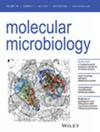(p)ppGpp Buffers Cell Division When Membrane Fluidity Decreases in Escherichia coli
IF 2.6
2区 生物学
Q3 BIOCHEMISTRY & MOLECULAR BIOLOGY
引用次数: 0
Abstract
Fluidity is an inherent property of biological membranes and its maintenance (homeoviscous adaptation) is important for optimal functioning of membrane‐associated processes. The fluidity of bacterial cytoplasmic membrane increases with temperature or an increase in the proportion of unsaturated fatty acids and vice versa. We found that strains deficient in the synthesis of guanine nucleotide analogs (p)ppGpp and lacking FadR, a transcription factor involved in fatty acid metabolism exhibited a growth defect that was rescued by an increase in growth temperature or unsaturated fatty acid content. The strain lacking (p)ppGpp was sensitive to genetic or chemical perturbations that decrease the proportion of unsaturated fatty acids over saturated fatty acids. Microscopy showed that the growth defect was associated with cell filamentation and lysis and rescued by combined expression of cell division genes当大肠杆菌膜流动性降低时,(pp)ppGpp 可缓冲细胞分裂
流动性是生物膜的固有特性,保持流动性(同黏适应)对膜相关过程的最佳运作非常重要。细菌细胞质膜的流动性随温度或不饱和脂肪酸比例的增加而增加,反之亦然。我们发现,缺乏鸟嘌呤核苷酸类似物 (p)ppGpp 合成的菌株和缺乏参与脂肪酸代谢的转录因子 FadR 的菌株表现出生长缺陷,而生长温度或不饱和脂肪酸含量的增加可挽救这种缺陷。缺乏 (p)ppGpp 的菌株对降低不饱和脂肪酸比例而不是饱和脂肪酸比例的遗传或化学扰动很敏感。显微镜检查显示,生长缺陷与细胞丝状化和溶解有关,通过质粒联合表达细胞分裂基因 ftsQ、ftsA 和 ftsZ 或功能增益的 ftsA* 等位基因可以挽救,但不能过度表达 ftsN。这些结果表明,(pp)ppGpp 通过增强 FtsZ 原环的稳定性,在膜流动性丧失过程中对细胞分裂起着积极的调节作用。据我们所知,这是首次报道细菌适应膜流动性丧失所需的(p)ppGpp 介导的调控。
本文章由计算机程序翻译,如有差异,请以英文原文为准。
求助全文
约1分钟内获得全文
求助全文
来源期刊

Molecular Microbiology
生物-生化与分子生物学
CiteScore
7.20
自引率
5.60%
发文量
132
审稿时长
1.7 months
期刊介绍:
Molecular Microbiology, the leading primary journal in the microbial sciences, publishes molecular studies of Bacteria, Archaea, eukaryotic microorganisms, and their viruses.
Research papers should lead to a deeper understanding of the molecular principles underlying basic physiological processes or mechanisms. Appropriate topics include gene expression and regulation, pathogenicity and virulence, physiology and metabolism, synthesis of macromolecules (proteins, nucleic acids, lipids, polysaccharides, etc), cell biology and subcellular organization, membrane biogenesis and function, traffic and transport, cell-cell communication and signalling pathways, evolution and gene transfer. Articles focused on host responses (cellular or immunological) to pathogens or on microbial ecology should be directed to our sister journals Cellular Microbiology and Environmental Microbiology, respectively.
 求助内容:
求助内容: 应助结果提醒方式:
应助结果提醒方式:


